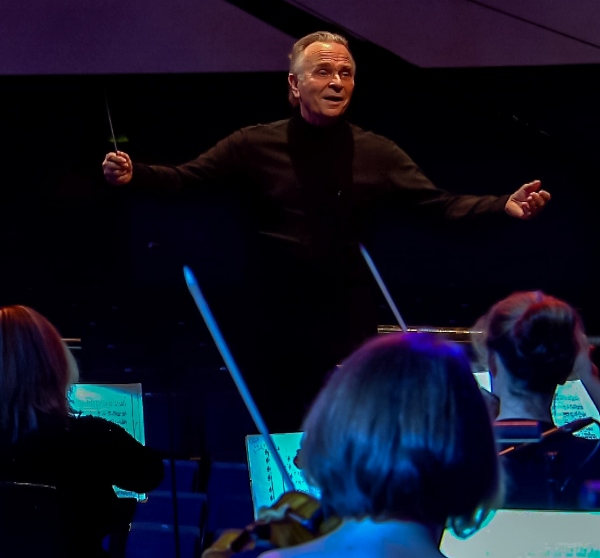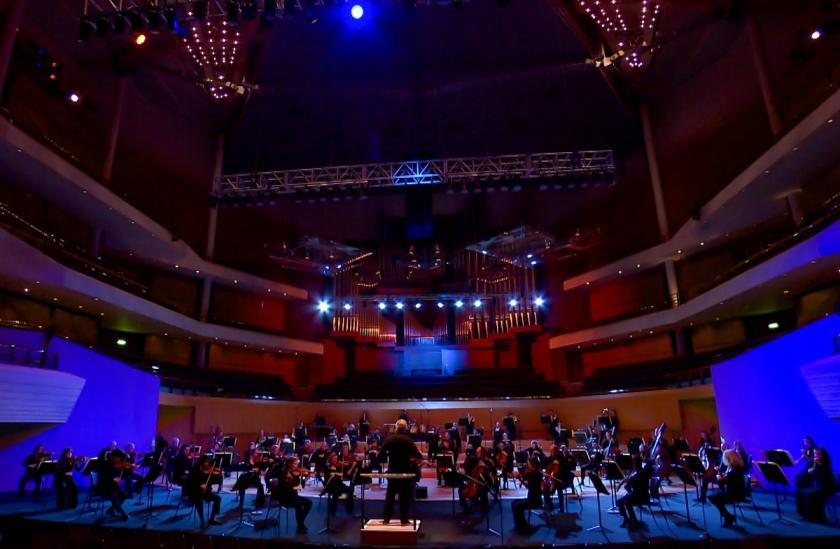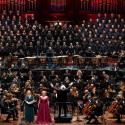The Hallé have been slow off the mark, compared with some, in their response to the challenge of concert-giving in the Covid era. But now that they have delivered on the first of their winter season performances, it has clearly been worth the wait. They are offering not merely online musical performances but a set of newly made, highly creative films, watchable on Vimeo, built around the works they’re playing and the sight and sound of them doing so. Not less than a "live" performance, but quite a lot more.
In "normal" times, you wouldn’t get as close to musicians in full flow as you do in this experience, filmed by Maestro Broadcasting. In the first episode, the film opens with some shots of Manchester life, homing in on the Bridgewater Hall and then straight into the first piece: Huw Watkins’ Fanfare for the Hallé for 11 brass players, a world premiere.
Later we find ourselves in free flight, hovering around the Bridgewater Hall as the music is played (some other episodes will be filmed in the orchestra’s rehearsal and recording base, Hallé St Peter’s). Lighting and camera angles make it a visual feast in itself: one’s hardly aware that the platform has been vastly extended and every one of the 68 or so players is socially distanced from every other. There are zooms and close-ups, clever cutting and mixing … and, for once, we also see the conductor as the musicians do: something considered appropriate for the cheapest seat prices in "normal" concerts, but long known to TV producers as a bonus of having cameras on stage for orchestral performances. In this case, it’s Sir Mark Elder, and he also takes the role of presenter, interviewing Huw Watkins and introducing the other music before it’s played.
 The music, of course, is what counts for most, and (making allowances for the inadequacies of internet connections, computer processing and personal headphones, as one must) I can still say that the experience is terrific. The Hallé as an orchestra may have been silent for eight months, but the magic is still there. There’s a theme of "firsts" in the programme. The Watkins piece is clearly conceived with this re-consecration of the house in mind, and also points forward to the final performance of this season of nine, in which the Hallé will give the premiere of his Symphony no. 2. Its texture gains in density and its music in forcefulness through to its emphatic end.
The music, of course, is what counts for most, and (making allowances for the inadequacies of internet connections, computer processing and personal headphones, as one must) I can still say that the experience is terrific. The Hallé as an orchestra may have been silent for eight months, but the magic is still there. There’s a theme of "firsts" in the programme. The Watkins piece is clearly conceived with this re-consecration of the house in mind, and also points forward to the final performance of this season of nine, in which the Hallé will give the premiere of his Symphony no. 2. Its texture gains in density and its music in forcefulness through to its emphatic end.
Next comes a suite from Wagner's Die Meistersinger, the Prelude to Act 1 of which has long been a kind of banner to be unfurled marking new eras in the history of this most historic orchestra, including those of Richter and Barbirolli. The suite begins with the Prelude to Act 3, runs into the Dance of the Apprentices and finds its end in its beginning with the majestic Act 1 Prelude. If anything, this is the most magical music-making of all. A total of 43 strings may not seem much for playing Wagner (though Hallé himself is known to have taken an orchestra of even smaller dimensions for Wagner nights in far-flung places in northern England in his day), but the sound is utterly beguiling, and the playing – particularly the strings, led on this occasion by Eva Thorarinsdottir – is somehow sumptuous and transparent at the same time.
Lovely portamenti match the sheer charm of the mellow Act 3 Prelude, and there are wonderful transitions such as the thrilling approach to the Mastersingers’ theme and the violins dancing down their scales as they approach the Nuremberg tune. Once we’re in the Act 1 Prelude, the music seems to grow organically as it sings and soars its way through Sir Mark’s expansive tempi to a glorious finish.
The last piece might seem an unusual choice, but apparently this is the first time Sir Mark (pictured above) has conducted Brahms’s First Symphony with the Hallé Orchestra. His reading is refreshing: he doesn’t always linger where others tend to, and he obtains that authentic Hallé dolce sound in the second and third movements, with a kind of restrained luxuriance that makes the lyrical highspots the more effective. There is a sense of the elegiac, and Brahms’s balm is poured out beautifully. In the finale, things are different: it’s all about holding back until the right moments. But when they come, there’s electrifying life in the playing, and the big tunes positively sing for joy.














Add comment